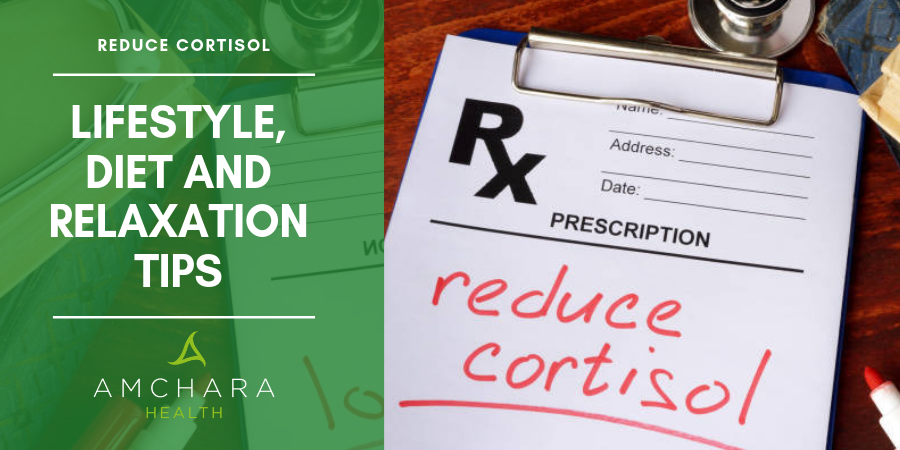11 Ways to Reduce Cortisol Levels Naturally:
1 | 2 | 3 | 4 | 5 | 6 | 7 | 8 | 9 | 10 | 11
Book a Free Hormone Health Consulation
What is cortisol?
Cortisol is a hormone which is often referred to as the stress hormone.
We always take an evidence-based approach to provide you with actionable knowledge and tips to help you on your journey to optimal health. This article focuses on the functions and effects of cortisol on your health, the physiology of stress and 11 practical ways to manage your cortisol levels.
What is stress?
We all run around in a stressful world, but have you ever stopped to wonder what stress actually is and what effects it has on your body?
According to the Oxford Dictionary, stress can be defined as ‘a state of mental or emotional strain or tension resulting from adverse or demanding circumstances’. Stressors can be physical – heat, cold, infection, trauma, overwork and noise, or psychological – bereavement, relationship problems, worry and money worries to name a few.
The physiology of stress
The release of cortisol involves three different organs – the adrenal glands, pituitary gland and the hypothalamus in the brain. Together they form the HPA axis and stimulate the production of cortisol when it is too low and block its production when cortisol levels are too high.
Any stress that is perceived in the brain relays information to the hypothalamus which secretes corticotropin-releasing hormone (CRH). This in turn stimulate the release of adrenocorticotrophic hormone (ACTH), which binds to special receptors in the adrenal glands to produce cortisol.
What effects does cortisol have?
Cortisol helps your body react to short-term stressors by delivering stored energy from the liver to the large muscles, increasing heart rate by narrowing the arteries, and reducing appetite and insulin production to prevent sugar being stored, so more is available for immediate use.
It also increases glucose uptake by the brain to increase cognition and perception. It makes us more aware of the stress and prepares us to react to it. After the short-term stressor has gone, cortisol levels fall back to normal.
Cortisol therefore influences our blood sugar, controls how the body uses carbohydrates, fats and proteins and affects blood pressure. It also decreases inflammation and plays a part in our sleep/wake cycle.
Are cortisol levels stable throughout the day?
Cortisol levels are naturally highest in the morning, they increase around half an hour after we wake up. They should decrease gradually during the day, in time for us to go to bed.
Levels start to gradually increase again 2-3 hours after we fall asleep. If we change time zones, cortisol will at first be out of kilter but will gradually adjust.
How does ongoing stress impact cortisol?
As we’ve seen, cortisol levels and stress are intimately connected. Often life consists of one stressor after another, so cortisol is continually being pumped out and remains high.
Although we do need cortisol to help us deal with the stress in our life, it’s not desirable for cortisol levels to constantly be high, as we’ll see. It’s as if we’re constantly being wired for fight or flight.
What are the effects of high cortisol levels?
The symptoms of high cortisol levels include:
-
high blood pressure
-
tiredness
-
muscle weakness
-
lowered resistance to infection
-
poor brain function such as brain fog and mood swings
High cortisol also leads to weight gain as is it encourages the laying down of fat, particularly visceral fat – the fat around the body’s organs which is a risk factor for cardiovascular disease.
When cortisol levels are high, the body constantly provides the body with glucose – effectively causing our cells to become insulin resistant. In fact, the symptoms of elevated cortisol are similar to those of insulin resistance.
Because one of the effects of cortisol is to reduce inflammation, over time prolonged elevated cortisol can suppress the immune system. Chronic inflammation itself is a stressor to the body and can cause cortisol levels to rise, in a vicious cycle.
Cortisol is manufactured from the same starting molecule as progesterone, so chronically high cortisol levels can cause female hormone imbalances.
Cortisol activates the sympathetic nervous system and suppresses the parasympathetic. Because of this, digestion suffers, as the parasympathetic nervous system – often called the ‘rest and digest’ system – ensures we digest food effectively.
Elevated morning cortisol levels in particular seem to lead to memory impairment, while late evening spikes can interfere with sleep.
Over a long period of time, chronic high cortisol levels can lead to a down-regulation of the system. Eventually low cortisol will be the result when the adrenal glands become fatigued and unable to pump out sufficient cortisol in response to stress.
Low cortisol levels can cause symptoms such as fatigue, dizziness, muscle weakness, weight loss, mood changes, and low blood pressure. Worn out adrenal glands are thought to be behind the development of chronic fatigue. The adrenal glands can also be attacked by infections, viruses or even the body’s own immune system, causing a relatively rare condition known as Addison’s disease, characterised by chronic fatigue, low blood sugar, inability to cope with stress, depression and blotchy dark skin.
How to decrease cortisol levels
Stress can’t always be avoided, certainly not completely, but we can learn how to better cope with the stresses of life.
The following suggestions will help you to reduce stress on your body and help your adrenal glands to function better.
1. Balance your blood sugar
If your blood sugar is out of balance it can place extra stress on your body.
The food we eat is converted into glucose which provides fuel for our cells. Refined carbohydrates like white bread, cakes, pastry, sugary snacks, sweets and biscuits result in a sudden release of energy into the bloodstream. This causes our blood sugar levels to spike rapidly, providing a temporary energy boost.
The trouble with this is that often the body reacts by producing too much insulin, which then causes the blood sugar to crash down too low. This means the body must raise the levels again which it can do rapidly by producing adrenaline to quickly mobilises sugar stored in muscles.
The catch is our adrenal glands also have the job of producing adrenaline, and if they are constantly pumping out adrenaline because of out of control blood sugar levels, they will tire and become less able to produce cortisol.
One of the most important ways we can support flagging adrenals is to balance blood sugar peaks and troughs.
The best way to achieve this is to avoid processed carbohydrates and concentrate instead on plenty of fresh, unprocessed vegetables. These contain natural fibre which means their energy is released in a more balanced way. Combine your vegetables with some good-quality protein like oily fish or chicken. It’s also a good idea to avoid coffee and alcohol which can disrupt blood sugar levels.
2. Improve your sleep
The stress of disrupted sleep leads to hyperstimulation of the HPA axis.
One study found that even after just one occasion when sleep time was altered – participants had their bedtime changed to 3pm – cortisol levels became elevated. If you’ve ever taken a long-haul flight, you’ll have experienced the effects of this. Other studies found evening cortisol levels are correlated with the number of times people wake up during the following night, and this is irrespective of whether they suffer from insomnia or not.
People who normally sleep for a short duration have been found to have higher cortisol levels than those who naturally sleep longer. People who work shifts have higher cortisol levels than those who don’t.
There are many strategies for improving sleep, like avoiding caffeine in the afternoon, banning gadgets and the TV from bedrooms, going to bed at a similar time each evening and taking a warm bath with Epsom salts before bed. Essential oils like lavender can also help. Above all try not to become anxious if you can’t sleep, as this will cause the stress response to kick in, making it even less likely you will nod off.
3. Exercise
Although intense and moderate exercise both increase cortisol levels, they drop back down shortly afterwards. This temporary spike in cortisol manages the body’s response to the stress of the exercise. This increase does reduce with habitual exercise. However, over-exercising is not beneficial as this can lead to elevated cortisol which does not reduce.
Choose exercise that you enjoy and do not beat yourself up if you don’t do it. Even getting out and walking in the fresh air is excellent exercise. Everyone is different in terms of what type of exercise they prefer. Try aerobics, yoga, Pilates, jumping on a rebounder or join a dance class.
4. Avoid arguments
Conflict with partners, family and co-workers is very difficult to avoid, but the stress of arguments raises cortisol levels. One way to deal with conflict may be mindfulness, which is a simple form of meditation. In a mindful state, a person learns to be fully present in the moment and not reactive or overwhelmed by outside events. By doing so they are able to observe themselves without criticism and therefore recognise negative thought patterns before they can become controlling.
One study looked at couples who engaged in a conflict discussion with their partner in a laboratory. They reported their levels of mindfulness according to the Toronto Mindfulness Scale, which is one of the earliest tools used to measure mindfulness. The results showed higher levels of mindfulness during conflict led to a faster cortisol recovery or avoided a slowed recovery during continued conflict.
5. Laugh
Laughter is after all the best medicine it seems. One study showed a 30-minute funny film to healthy individuals. Researchers found the participants’ cortisol levels were reduced after watching the film. Their interleukin levels also reduced – these are proteins which stimulate immune response and inflammation.
6. Engage in a hobby
It may sound trivial, but the effect on stress levels of taking time out to do something you enjoy shouldn’t be overlooked. One study involving US combat veterans with a history of stress-related problems including substance abuse found that gardening for 5 hours a day reduced cortisol levels by 12% over a three-week period. It also reduced symptoms of depression.
Don’t use the excuse that you don’t have time – the investment will be worth it.
7. Social support
A good support network is crucial. When we feel supported, we feel less stress.
One study found social support from a partner can dampen the HPA axis response to a forthcoming public speaking task. Men reacted with less of a stress response when their partners were present, as opposed to a stranger, but the result was not replicated in women. However, another study found cortisol levels dropped in women who smelled their partner’s shirt during a stress test which involved a mock job interview.
8. Even better – get a pet
Researchers examined the cortisol levels of 48 people performing a stress test on their own, with their partner, or with a dog (which was not their own dog). Their cortisol was lower after the stress test when they were in the company of the dog, and surprisingly it was lower than when they were accompanied by their partner!
9. Supplements and herbs
A number of supplements may be useful to reduce cortisol.
Fish oil is a rich source of omega-3 fatty acids EPA and DHA which, apart from lowering inflammation, have been found to reduce cortisol levels after a stress test involving mental arithmetic.
Ashwagandha is a herb traditionally used in Ayurvedic medicine where it is known as the king of Ayurvedic herbs. It’s been typically used for over 3,000 years as an adaptogen for stress relief. The name Ashwagandha means ‘smell of the horse’ in Sanskrit, because Ayurveda traditionally believes it will restore the strength of a horse. Studies have found that this herb can lower cortisol levels in people with a history of chronic stress.
Rhodiola Rosea is an adaptogenic herb which has been used for many years in Russia. Rhodiola may reduce the secretion of cortisol in stressful periods and has been found to reduce awakening stress in people with chronic fatigue.
The full range of B vitamins are needed by the adrenal glands, as well as vitamin C.
10. Diet
Avoid caffeine and alcohol, which not only disrupt blood sugar levels but can also interfere with sleep and rob the body of B vitamins.
Resist the urge to reach for sugary snacks which will contribute to the blood sugar roller-coaster and can tire out the adrenals. Choose whole, unrefined foods, combined with healthy proteins including oily fish.
11. And finally – relax!
Are you constantly on the go and never manage to fit in in any ‘me time’? Although with a mammoth ‘to-do’ list, spending time on yourself may seem selfish and indulgent, actually it reaps rewards in terms of your health and developing your resilience to ongoing stress.
Set aside some time for yoga, meditation or try some simple deep breathing exercises. This type of breathing teaches us to breathe through our abdomen, which calms our nervous system. With a bit of practise deep breathing can become second nature.
Try the different techniques recommended by Dr Axe.
Or why not reward yourself with a relaxing break at an Amchara Health retreat? There you’ll be able to try yoga and meditation in a totally supportive atmosphere.
Amchara retreats also offer an opportunity to measure your heart rate variation (HRV). HRV measures the range of intervals between your heartbeats. This is an important indicator of the physiological and emotional resilience of your autonomic nervous system and reflects your capacity for adapting to stress. Because your heart sends messages to your brain, the more ordered and stable the heart rate, the more emotionally balanced you feel. Learning how to regulate your heartbeat can have a profound effect on anxiety and therefore cortisol levels.
Biofeedback devices such as Heartmath can therefore help us alter our physiological response to stress.
How can your cortisol levels be checked?
Saliva hormone testing can evaluate adrenal function and fluctuations of cortisol levels at different times of the day over a 24-hour period. It also measures other important hormones produced in response to stress.
Salivary hormones reflect the levels of hormones inside our cells where they exert their effects. Blood tests on the other hand measure circulating hormones outside of the cells. By measuring hormone levels in this way we can find out whether the adrenal glands are healthy, flagging or in collapse. These tests are convenient, accurate and give a good picture of how your body is responding to stress throughout the day.
By understanding what impacts upon the production of cortisol and other stress hormones and by adopting the 11 measures above, we can go a long way towards lowering our stress and cortisol levels and begin to ‘Change for Good’.
READ NEXT:









